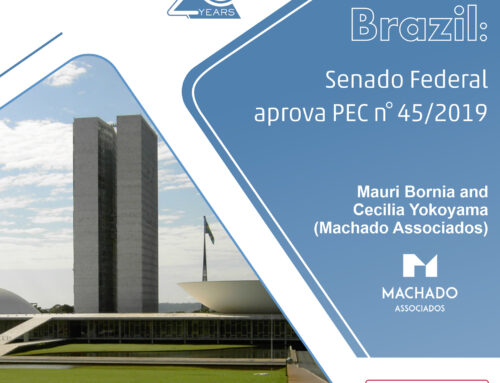Brazil and Colombia: Double Taxation Avoidance Treaty Between Brazil and Colombia
Last year, Brazil and Colombia signed a double taxation avoidance treaty (“DTA”) which is being processed for approval by the Congresses.
We highlight some aspects of the DTAA that we believe may be particularly relevant.
Permanent Establishment (“PE”).
The INDC includes a broad definition of PE based on the UN model treaty. In addition to fixed place of business and agent PEs, the INDC includes an extensive definition of construction PEs and services PEs.
The definition of construction PE includes works, construction projects, assembly, installation and supervision activities lasting more than 6 months.
The services PE will be configured by the provision of services (which includes consulting services) in the other State for a period of more than 6 months.
The PE of agent may exist not only in cases where contracts are usually concluded on behalf of the foreign company but also in cases where the principal role for the conclusion of the contracts is usually performed.
In addition, a PE may arise if an insurance company collects premiums in the territory of the other State insuring risks located there.
The application of the broad definition of PE contemplated in this IDC must take into account the domestic laws of Brazil and Colombia. In particular, the current definition of PE in Colombia is more limited than that of this INDC. However, events that generate a Significant Economic Presence in Colombia should be interpreted in accordance with the definition of PE in this BIT if the foreign company is a tax resident in Brazil.
Brazilian tax legislation, on the other hand, does not contemplate the concept of PE, focusing on the taxation at source of income obtained by foreign legal entities (taxation at source).
Dividends
As a general rule, dividend withholding is limited to 15%.
This limit will be reduced to 10% if the recipient of the dividends is (i) a beneficiary that has owned, directly or indirectly, 20% or more of the capital of the company or (ii) a pension fund recognized by the other Contracting State.
These limits do not prevent Colombia from using the corporate income tax recapture mechanism in the case of untaxed dividends held by the corporation. In this case, the BIT allows the effective withholding tax to be much higher.
Currently, dividends paid by Brazilian companies to foreign shareholders are not subject to income tax withholding. However, there are Bills under discussion in the National Congress that intend to introduce dividend taxation. The CDI could be an advantage if the rate of taxation at source provided by the tax legislation is higher than the limits provided by the CDI.
Interest
The withholding tax rate on interest is limited to 15%.
This limit may be reduced to 10% in the case of loans to finance the purchase of industrial or scientific equipment or infrastructure projects and public services. In this case, the beneficial owner of the interest must be a bank or financial institution and the loan must have a minimum term of 5 years. This 10% limit is also applicable to loans made by pension funds.
Interest derived from loans made by one State to the other State may not be subject to withholding tax.
Interest on equity (Juros sobre capital próprio – JCP) under Brazilian tax law is classified as “interest” for purposes of this DTA.
Royalties
As a general rule, withholding tax on royalty payments is limited to 10%. In the case of royalties derived from the use or right to use trademarks, the limit will be 15%.
Fees for technical services
In line with the UN Model and recent BITs signed by Brazil, this BIT contains a clause that specifically regulates the taxation of technical services. Fees paid for technical services rendered by a company of the other State may be subject to taxation with a limit of 10% (the beneficial owner clause must be respected).
From the Colombian perspective, this provision is atypical.
The concept of technical services in Brazilian tax law is extremely broad and covers almost all services.
Capital Gains
Contrary to the usual stipulations under the OECD model regarding the taxation of capital gains, this DTA does not establish a general rule that confers the power to tax capital gains solely to the country of residence.
Regarding the sale of shares in companies domiciled in one of the contracting states, this DTA does not limit taxation by the country of source (where the company is domiciled).
From a Brazilian perspective, this provision is very common.
Taxation of international maritime and air transportation
According to the ITC, profits from the operation of ships and aircraft in international traffic may only be taxed in the country of residence of the enterprise.
Profits subject to this treatment include profits from the bareboat charter of ships or aircraft; profits from the use, maintenance or rental of containers used for the transportation of goods or merchandise; and profits derived from participation in consortiums, joint ventures or international operating agencies. In other words, this provision covers the disposal of any property other than real estate used for the operation of ships or aircraft.
It should be noted that there is currently in force an agreement signed between Brazil and Colombia in 1992 that limits the taxation of the activities of maritime or air navigation companies only to the country of which they are nationals.
Employment Income and Director’s Fees
Employment income will only be taxed in the country of residence, unless the work is carried out in the other country. For the application of this limitation it is necessary not to stay in the other country more than 183 days per year, and that the remuneration is not paid or borne by a resident or PE of the other country.
Fees received by a member of the board of directors, or any similar body, may be subject to taxation in the country where the company is located, even if the person resides in another country.
Wealth Tax
The DTA between Colombia and Brazil does not limit wealth tax.
Elimination of Double Taxation
The DTA provides that both Brazil and Colombia will allow an income tax deduction equal to the income tax paid in the other State. Such deduction, however, may not exceed the fraction of income taxes, calculated before the deduction, corresponding to the income that may be taxed in the State of residence.
Anti-Abuse Provisions
This DTA contains a provision based on the UN model convention on the right to treaty benefits.
In addition to a catalog of situations for a resident to be a “qualified person” to be entitled to the benefits of the BIT, Article 28 contains a principal purpose test provision.
This provision allows for the denial of treaty benefits if a company channels funds through Colombia or Brazil to reduce its tax burden. In addition, this rule includes a special provision in the case of triangulation schemes through a PE in a third jurisdiction.
General Considerations
The implementation of the BIT between Colombia and Brazil is a long awaited tax development that will foster increased reciprocal investments and cooperation between the two countries.
The BIT must undergo the corresponding approval process in both countries. In Colombia, it must be approved by Congress and be subject to a constitutionality review by the Constitutional Court and, in Brazil, the DTA will be analyzed by the National Congress for subsequent enactment by the President.
Writer: Federico Lewin and Alejandro Neis (Lewin & Wills) and Stephanie Makin and Alessandra Pela Sabbag (Machado Associados)
Original: https://lewinywills.com/tratado-para-evitar-la-doble-imposicion-entre-brasil-y-colombia/





